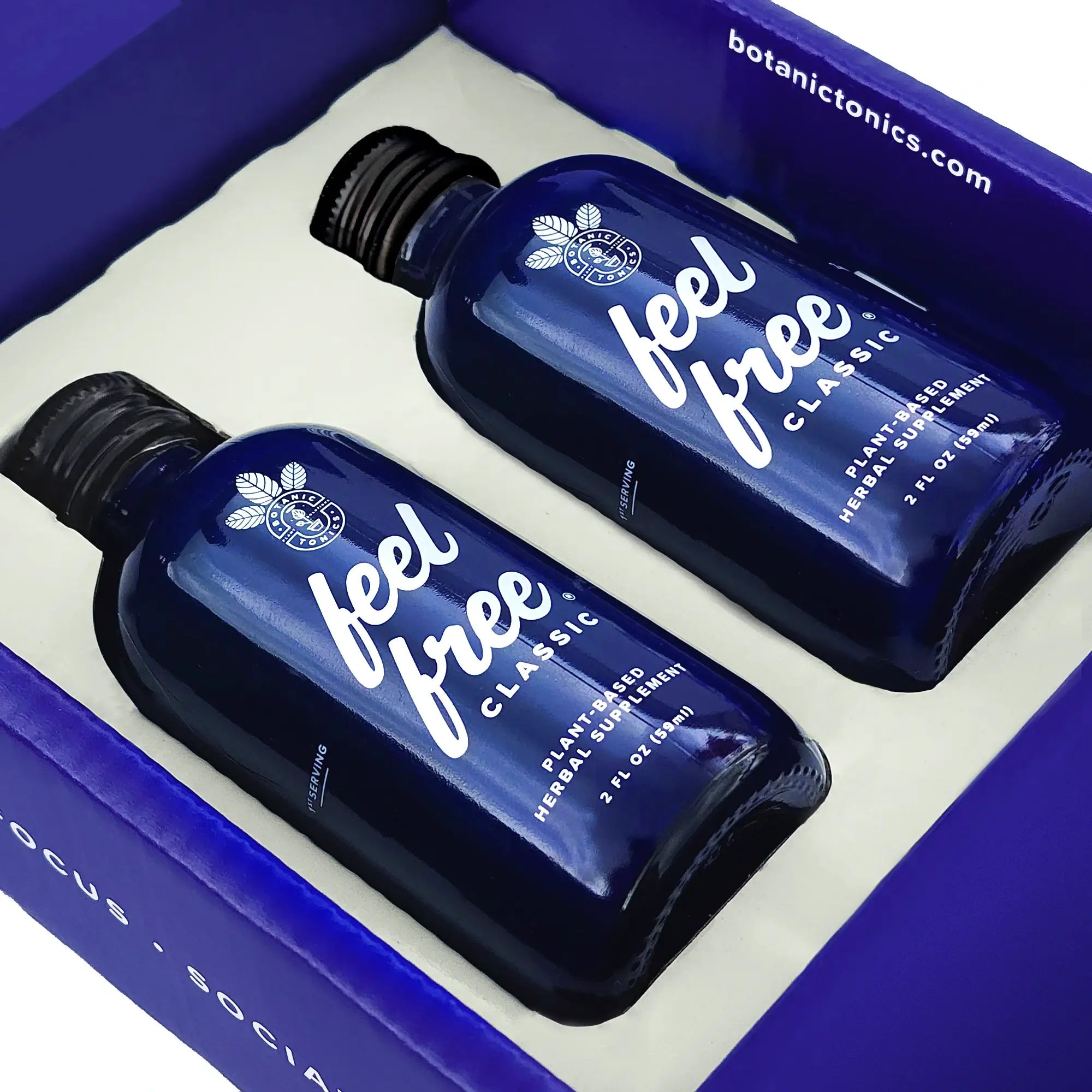Kava is an all-natural supplement with roots in the South Pacific, often consumed to achieve a sense of calm, ease, and focus. The plant extract has been used ceremonially for thousands of years, but has recently gained global popularity in capsule and tonic form. While many kava enthusiasts enjoy the gentle buzz and boost it provides, the supplement may offer even more lesser-known benefits.
In addition to its myriad other uses, some research shows kava’s promise to invite relief from headaches and migraines. Read on for the breakdown on how the supplement might help with headaches, the benefits of choosing kava for headaches, and how we recommend taking it.
Kava Basics
Made from the roots or stump of a plant from the pepper family (Piper methysticum), kava use offers a variety of benefits. First domesticated in the South Pacific (starting in Vanuatu and spreading to Hawai’i, Fiji, Samoa, and Tonga), the root was traditionally used in ceremonial drinks.[1] For 2500 years, individuals have enjoyed kava to give them a sense of connection and serenity.
Today, kava extract is used in dietary supplements, often in the form of liquid tonics or capsules (but is also still used in ceremonial teas and even baked into brownies or cookies).
When used in social settings, kava may promote calm and relieve feelings of occasional anxiety. In other settings, like during work or projects, some individuals enjoy the extra sharpness it brings to their focus—all without the crash of caffeine that typically comes after a cup of coffee.
How Kava Can Help With Headaches
Aside from these advantages, kava also promotes well-being in other ways. For instance, it’s been largely looked at in recent years as a potential aid for the average headache.[2]
Indeed, kava has some properties that have been linked to reducing headache symptoms. Let’s examine those characteristics.
#1 Anti-Inflammatory Properties
Aside from easing general feelings of discomfort, kava contains anti-inflammatory properties.[3] Inflammation can cause several types of headaches, including sinus headaches (caused by inflammation and congestion of the sinus cavities) and migraine headaches (often caused by inflammation of the dura, the membrane between the brain and the skull).[4,5]
Studies have shown that kavalactones, the “active ingredient” phytochemicals found in kava, are its anti-inflammatory secret weapon.[3] A dose of kavalactones can not only promote an emotional sense of relief but also ease inflammation throughout the body, which may relieve pain and discomfort in the targeted area (such as your head).
#2 Enhancing GABAA Receptor Function
Additionally, these very same kavalactones work by enhancing and increasing the function of GABAA receptors in the brain and nervous system.[6,7] Research has shown that these neurotransmitters play a role in suppressing headache attacks, and severe migraine attacks may lessen in the presence of reduced GABA levels.[8]
Therefore, as they work to ease hyperactivity in the nervous system, kavalactones may also help prevent future headaches by promoting GABA A receptor function (and even replenishing GABA levels from a previous migraine’s damage).[8]
#3 Relaxing Muscles
Kava is shown to have muscle-relaxing properties, easing the nervous system in order to release tension in the body.[9] Muscle relaxants have been shown to help fight migraines in certain cases, as these types of headaches often cause muscles in the head and neck to contract (this is why rubbing your temples and the back of your head can yield temporary relief).[10] Muscle relaxants might even help calm the brain mechanisms responsible for setting off a migraine.
Muscle relaxants are also often used to treat tension headaches, which are caused by muscle tightness in the head, scalp, or neck.[11] Kava and exercise mesh well for this very reason—kava can help muscles recover and relax after exertion.
Finally, muscle relaxants can be used to treat chronic headaches resulting from clenched or tight muscles. This is particularly true in the case of TMJ—when muscles in the jaw tense up, the discomfort can spread to other parts of the head, causing a “TMJ headache,” often counteracted with a muscle relaxant medication or even Botox.[12]
#4 Preventing Headache Triggers
Kava may act as a preventative measure against other common causes of headaches. For example, stress is a commonly cited trigger for headaches and migraines and kava has been shown to ease feelings of stress (as well as the hyperactivity they cause in the nervous system).[4, 13]
The same goes for caffeine: caffeine withdrawal often causes headaches, but kava can be used as a caffeine replacement (offering the same boost in focus while helping to ease headaches).[14]
Benefits of Kava for Headache Relief
Kava is an all-natural, plant-based aid to the body and mind, and provides a pleasant sense of calm and relaxation in addition to washing worries away. Not only can kava help fend off many causes of headaches (like inflammation, stress, and caffeine and alcohol use), it may also help fight the effects of headaches (like low GABAA receptor supply).
Kava shouldn’t be used to replace medication, but thanks to its anti-inflammatory properties, it may provide relief for partakers who are allergic to NSAIDs (anti-inflammatory drugs like aspirin and ibuprofen).[15]
Moreover, kava is generally not considered highly addictive, despite its ability to promote a mental state of calm.[16] For migraine sufferers or individuals seeking relief from repeat or chronic headaches, kava may work as a relieving tool without being addictive like other medications.
Plus, that restored sense of ease amidst a troublesome headache can make all the difference.
How to Use Kava for Headaches
When using kava products to seek headache relief, consult with your doctor or a healthcare professional to ensure you’re consuming it properly and safely. While there are various ways to consume kava, be sure that you’re taking the supplement safely and in the proper dosage.
Dosage Recommendations
It’s essential to consume kava in the correct doses in order to avoid any unwanted side effects. Follow the dosage instructions on your individual kava product. For example, we recommend a serving of no more than one ounce of feel free kava kratom tonic, or no more than six feel free capsules per day.
An effective dose of kavalactones is typically around 70–250mg (check the nutrition facts for specific kavalactone content).[17] This kava dosage might vary depending on your unique body makeup—as little as 40mg may be used for a mild calming effect and release of muscle tension, while up to 600mg is sometimes consumed in a traditional kava ceremony.
Consumption Methods
There are various methods for consuming kava. The traditional kava ceremony involves straining kava into a drink, which is to be drunk just before a meal.[18] Though generally accepted to be best consumed on an empty stomach, kava is sometimes added to baked goods as well.
Since they’ve gained global popularity, kava supplements are most commonly sold as capsules, gummies, or tonics. Kava tonics are typically a concentrated shot of kava extract which can then be served as a chilled liquid. Capsules and gummies typically contain kava extract powder, and might contain other ingredients as well. When you know how to store kava, you can make your capsules, supplements, and even tonics last longer and stay their freshest.
Finding Quality Kava for Headaches
When using kava to ease discomfort, such as from a headache, it’s crucial to ensure the kava supplement you choose is high-quality to avoid adverse effects.
Check the label: are the other ingredients in your supplement all-natural? Are there other active ingredients besides kava?
Research your supplier to ensure your kava is sustainably and responsibly sourced (for example, does your supplier honor the tradition of kava and adequately compensate growers?).
Finally, choose all-natural kava root extract rather than synthetic alternatives whenever possible. Kava plants have been consumed for centuries, and Mother Nature’s version is generally preferred against lab-created options.
Find Ease in Every Day With Botanic Tonics
There’s nothing worse than feeling a headache or migraine coming on, but with a kava supplement in tow, it doesn’t have to ruin your day. Kava may help fight the causes behind headaches (from inflammation to caffeine withdrawal), can promote a sense of ease in the face of everyday challenges, and can even help prevent future headaches (i.e. by replenishing lost GABAA receptors).
The benefits of kava have been enjoyed in the South Pacific for millennia, and Botanic Tonics is here to bring them to you.
Our supplements are available as both kava tonics and capsules. Botanic Tonics kava shots and capsules kick in within 15–20 minutes, and the calming boost of comfort they provide lasts 3–4 hours.
When you stock up on feel free tonic or capsules, you’ll always have a cool head on your shoulders.
Sources:
- University of Hawai’i. Kava: The Drink of Peace. https://www.ctahr.hawaii.edu/deFrankJ/Streaming%20Media/Windows_Media/hcb_BEVERAGE_CLASS_F2011/text_f2011/pdf_slideshows_f2011/kava01_11112011_%20lecture.pdf
- Rolling Stone. Kava: Inside the All-Natural High That’s Sweeping America. https://www.rollingstone.com/culture/culture-news/kava-inside-the-all-natural-high-thats-sweeping-america-125828/
- National Library of Medicine. Kava as a Clinical Nutrient: Promises and Challenges. https://www.ncbi.nlm.nih.gov/pmc/articles/PMC7600512/
- Mayo Clinic. Headache. https://www.mayoclinic.org/symptoms/headache/basics/causes/sym-20050800#:~:text=Sinus%20headaches%20(caused%20by%20inflammation,spinal%20tap%20or%20spinal%20anesthesia)
- UC Davis Health. Migraine causes, symptoms, treatments, and more. https://health.ucdavis.edu/blog/cultivating-health/migraine-causes-symptoms-treatments-and-more/2022/12#:~:text=What%20is%20migraine?,and%20changing%20local%20blood%20flow.
- Cleveland Clinic. Gamma-Aminobutyric Acid (GABA). https://my.clevelandclinic.org/health/articles/22857-gamma-aminobutyric-acid-gaba
- ScienceDirect. Kavalactones. https://www.sciencedirect.com/topics/neuroscience/kavalactones
- National Library of Medicine. OCCIPITAL LEVELS OF GABA ARE RELATED TO SEVERE HEADACHES IN MIGRAINE. https://www.ncbi.nlm.nih.gov/pmc/articles/PMC3600581/#:~:text=Accordingly%2C%20we%20suggest%20that%20GABA,consequence%20of%20severe%20migraine%20attacks
- University of Rochester. Kava Kava. https://www.urmc.rochester.edu/encyclopedia/content.aspx?contenttypeid=19&contentid=KavaKava#:~:text=Kava%20is%20used%20most%20often,to%20ease%20stress%20and%20anxiety.
- New York Headache Blog. Muscle Relaxants for Migraines. https://www.nyheadache.com/blog/muscle-relaxants-for-migraines/#:~:text=Muscle%20relaxants%20also%20do%20more,exists%20for%20tizanindine%20(Zanaflex).
- Mount Sinai. Tension headache information. https://www.mountsinai.org/health-library/diseases-conditions/tension-headache
- Healthline. TMJ Headache: What You Should Know. https://www.healthline.com/health/tmj-headache#causes
- NLM. Kava for the treatment of generalised anxiety disorder (K-GAD): study protocol for a randomised controlled trial. https://www.ncbi.nlm.nih.gov/pmc/articles/PMC4630875/
- Web MD. Can Caffeine Give You Headaches? https://www.webmd.com/migraines-headaches/triggers-caffeine
- Australian Society of Clinical Immunology and Allergy. Allergic reactions to aspirin and other pain killers. https://www.allergy.org.au/patients/drug-allergy/allergic-reactions-to-aspirin-and-other-pain-killers#:~:text=People%20who%20have%20hives%20
- Government of New South Wales. Kava clinical factsheet. https://www.health.nsw.gov.au/aod/resources/Pages/kava-clinical-factsheet.aspx#:~:text=Evidence%20suggests%20that%20kava%20is,to%20occur%20in%20certain%20contexts.
- Healthline. Kava Kava: Benefits, Side Effects, and Dosage. https://www.healthline.com/nutrition/kava-kava
- University of Hawai’i. Gardiner: The Kava Ceremony. https://www.hawaii.edu/oceanic/rotuma/os/Gardiner/GdrKavaCeremony.html















